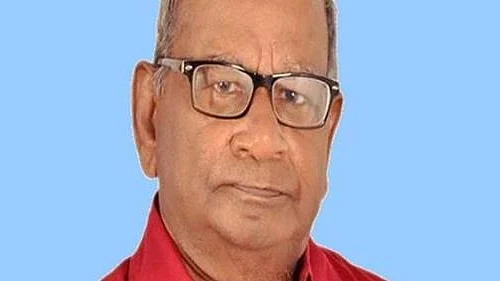Raj Kishore: Among the last good men of Hindi journalism
Raj Kishore, the well-known journalist and writer, passed away on Monday. He was known to always speak his mind, no matter the odds or consequences

Raj Kishore was a writer among journalists and a journalist among writers. Not many people have the quality these days. I don’t remember where I read, perhaps in Tadbhav, a literary Hindi magazine, that people said the same about the popular Hindi writer Manohar Shyam Joshi too.
He was revered as a writer among journalists and threw his weight around as a journalist among writers. He effortlessly switched between the two roles.
Although he is no more with us, still the intellectual legacy that the 71-year-old Raj Kishore left behind is enough to make his name immortal. His interesting comments and insights into the topics of vulgarity, Dalit discourse, morality, feminism and sexuality, etc. will be deeply missed. His thoughts expressed in simple words and crisp style provoked laughter and tears, both at the same time.
For example, have a look at this sentence—If the intellectual level of an average woman is not on par with the intellectual level of an average man, then women will remain a problem both for themselves and the entire humanity.
Only Raj Kishore could say this. In an era of lopsided feminism, it is not without risk to say such a thing. But Raj Kishore believed in risking it all for his ideology and his convictions.
In present times, when journalism is deeply stained with communalism and journalists like Sudheer Choudhary and Arnab Goswami have become role models, Raj Kishore’s absence would indeed be missed. Like his writings, his indomitable spirit was admirable.
At times, his ideas seemed absurd, particularly his comments related to the feminist discourse seem to cross the proverbial boundary. Even his critics cannot deny this. We used to jokingly call him ‘Rajendra Yadav’ of journalism. (Rajendra Yadav was a revered Hindi writer, the publisher of reputed literary magazine ‘Hans’). And that’s true to an extent. The campaign that Rajendra Yadav kick started in his magazine “Hans” on the concerns of Dalits and women, Rajkishore carried that forward in Hindi journalism.
Like Rajendra Yadav, he never hesitated a bit in attacking the BJP and the RSS on the issue of communalism. It was perhaps the only issue he was not willing to budge on even a little. Otherwise, he was very democratic in his personal life. He used to take criticism in his stride, never disturbed or hurt by it.
In present times, when journalism is deeply stained with communalism and journalists like Sudheer Choudhary and Arnab Goswami have become role models, Raj Kishore’s absence would indeed be missed. Like his writings, his indomitable spirit was admirable.
Undoubtedly, he was shattered by his only son’s untimely death though he never let it get to him professionally. He constantly posted his thought-provoking comments on Facebook. Before he was admitted in ICU, one of his last comments was on defeating the BJP.
He wrote, “How to remove the BJP? There are many arrows in its bow, because it is the opposition of the entire modern India. It’s not sufficient to just counter the BJP’s issues. The opposition will have to highlight its own issues.”
Only Raj Kishore could call the BJP an opposition to India. The opposition parties of today may not even know his name, but it is true that it can only be a lame ambition to defeat the BJP without a strong opposition. The BJP may lose an election but the ideology it has been promoting has become stronger. And there is an urgent need to defeat this ideology.
He was deft at toying with language while expressing a serious thought. For example, his observation about the RSS, the parent organisation of the BJP, is as interesting as it is terse. He wrote, “The RSS is an anti-intellect organisation. Therefore, how can it cultivate intellectuals? This one sentence is sufficient to understand the RSS.”
A times, I thought that Raj Kishore had become jealous of the young writers who could match him in language skills and espoused the same liberal ideology as he did. Although I could never get the opportunity to confirm or reject this notion of mine.
It was in 2011-12, when the Anna movement was emerging strongly. I had written an article criticising Arundhati Roy, which became a topic of discussion because of its headline and content. The headline was – ‘Jao Arundhati, Hum Tumhe Pyar Nahi Karenge’ (Go, Arundhati, we will not love you).
This article was published in the popular blog, “Mohalla Live,” which was run by Avinash Das, who is now a well-established filmmaker. In the article, I had criticised Arundhati bitterly for rejecting Anna movement as corporate, returning the Sahitya Akademi Award, but accepting the Sydney Peace Prize. Commenting on this article, Raj Kishore time and again emphasised that he himself had been saying the same thing for a long time.
It felt as if Raj Kishore always kept struggling to maintain normalcy in his personality. He did not have the glow of Manohar Shyam Joshi, or the grandeur of Agyeya, nor the influence of Om Thanvi, nevertheless he was very special in his own way.
The young writers should be envious of Rajkishore’s hard work, tenacity, his deep understanding of issues facing India. There is so much to reminisce about, but in my view he will always be remembered for the thought-provoking series called Aaj Ke Prashn.
Raj Kishore could well be considered as one of the last objective and knowledgable Hindi journalists of his era.
(Translated into English by Pragati Saxena).
Follow us on: Facebook, Twitter, Google News, Instagram
Join our official telegram channel (@nationalherald) and stay updated with the latest headlines
